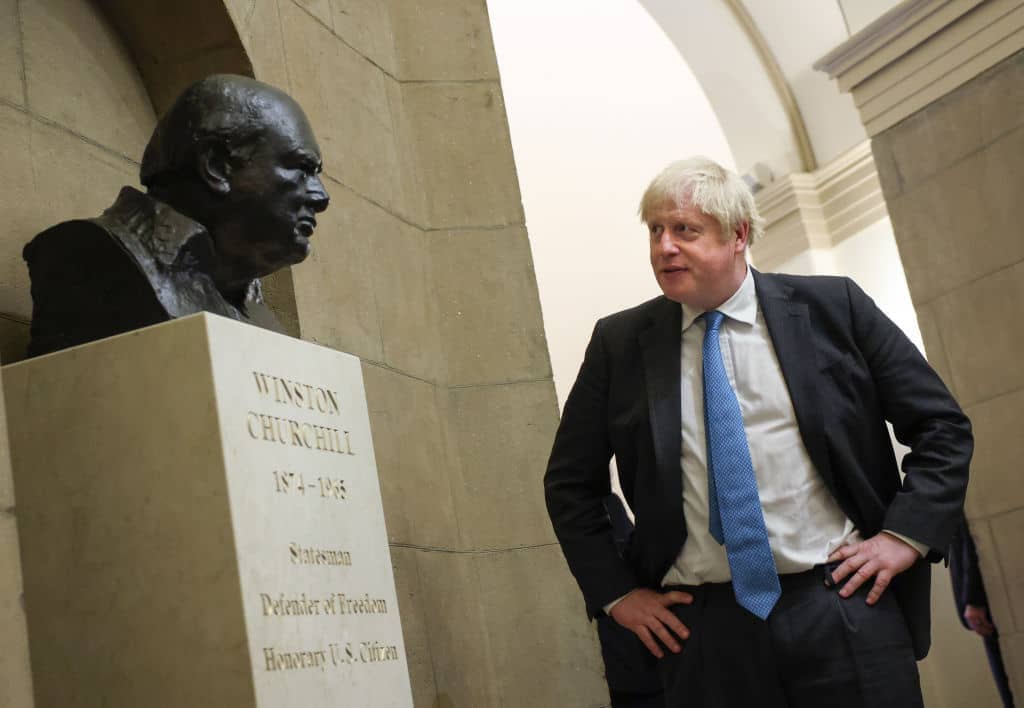Boris Johnson’s hero – apart from himself – is Winston Churchill, who led Britain through the dark valley of World War Two. Our present PM has even written an adulatory biography of the great man, and clearly would like to channel Churchill as a war leader and emulate his success. Will the war in Ukraine give him the opportunity?
Although Britain is not – yet – a direct belligerent in the current conflict, it is already playing a major role. It is supplying anti-tank NLAW weapons and missiles to the Ukrainians; it is ramping up diplomatic support for the invaded country; and – albeit unofficially – British Army veterans and volunteers have travelled to Ukraine to join the fight against the Russian invaders. Britain is also beginning to throw open its doors to Ukrainian refugees, including 21 cancer-stricken children.
Politically, here at home the war has had the unintended consequence of at least temporarily wiping the Partygate affair from the news agenda and public consciousness. Less than a month ago, the PM was on the verge of being ousted by his own MPs, and was already being written off by the many gleeful pundits who cannot abide the man. Today it is a rather different story.
The coming weeks and the course of the Ukrainian war may decide what verdict history passes on Boris Johnson
As a keen student of history, Johnson will be well aware of how previous Prime Ministers have behaved in wartime: the ultimate test of political leadership, and the times, in the words of Thomas Paine ‘that try men’s souls’. But Churchill is not the only model against which to measure himself. Other Prime Ministers over the last century have led the country through the fires of war and have either been tempered and emerged victorious or been tested to destruction and found wanting.
In October 1922, PM David Lloyd George was overthrown by the Conservatives in his coalition government, despite being dubbed as ‘the man who won the war’ – the conflict in question being World War One. In many ways the ‘Welsh Wizard’ was closer in character to our present PM than Churchill. A notorious ladies’ man, a colourful outsider, exclusively devoted to his own advancement, and a widely mistrusted chancer disliked by even his closest colleagues: ring any bells Boris?
Yet Lloyd George was also a dynamic force with an extraordinary ability to charm even his enemies into doing his bidding. Having intrigued his way into Number Ten at the height of the war, he galvanised Britain’s faltering war effort, introduced conscription, and took unprecedented powers to turn industry into a war-winning production machine. Like Boris exactly 101 years later, he was rewarded for ending the war with a stonking election victory in December 1918.
But politics is an ungrateful business, and despite having successfully negotiated the Versailles Treaty and another Treaty to give Ireland independence, Lloyd George was ousted by the Tories and never enjoyed power again. Similarly, Churchill’s reward for having led the country through the trials and tribulations of World War Two to the ‘broad sunlit uplands’ of victory over Nazi Germany was a crushing election defeat in 1945.
Churchill returned for an Indian summer of power, to be succeeded in 1955 by his long term lieutenant Anthony Eden who promptly embarked on a war of his own against Egypt for control of the Suez Canal. Suez was Eden’s undoing: beset by his own health problems, his judgment blurred by prescribed drugs, he embarked on a secret collusion with France and Israel in a military adventure that wrecked his promising Premiership when it was exposed .
Low intensity Colonial conflicts as the British Empire shut up shop, and the Northern Ireland ‘Troubles’ apart, Britain managed to avoid hot wars through the decades of the Cold War. Then, in 1982, Argentina invaded and occupied the Falkland Islands. Showing the resolution and resolve that won her the admiring accolade ‘Iron Lady’ from Russia, our first woman PM Margaret Thatcher acted.
Ignoring the cautious counsels of her damper ministers, Mrs Thatcher assembled a Task Force and ordered them to retake the islands, which, in short order, they did. Just as Suez was the breaking of poor Eden, so the ‘Falklands factor’ was the making of Thatcher, paving the way for electoral victory and giving her the confidence to remake Britain in her own redoubtable image.
In 2003, fresh from two thumping electoral victories of his own, Tony Blair imitated Eden instead of Thatcher when he embarked on an ill-advised military adventure as the junior partner to George W. Bush in invading Iraq. Even though Blair has at last admitted to the Archbishop of Canterbury that the ensuing disaster may have been a mistake, he still insists that at the time he thought that it was ‘the right thing to do’. As if that excuses the blood and misery that his decision unleashed.
There is little doubt that Iraq has trashed Blair’s reputation before the unmerciful bar of history whatever his other merits and achievements may have been. The coming weeks and the course of the Ukrainian war may decide what verdict history passes on Boris Johnson. If he takes a lead in helping Ukraine to withstand Putin’s armies in place of an enfeebled US president, all his past flaws and blunders may be forgiven and he will join the ranks of the Lloyd Georges, the Churchills and the Thatchers. If, however, Ukraine is vanquished and absorbed back into a greater Russia, then he will take his place with Eden and Blair, and history, to quote WH Auden, ‘May say ‘alas’ but cannot help or pardon’.






Comments